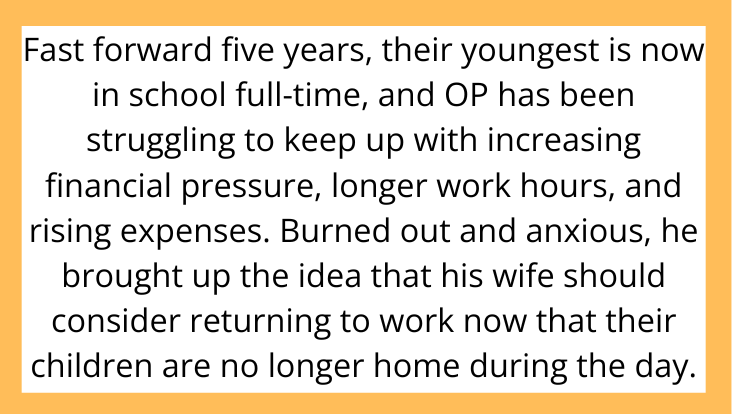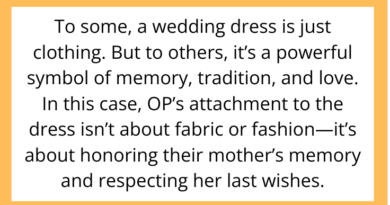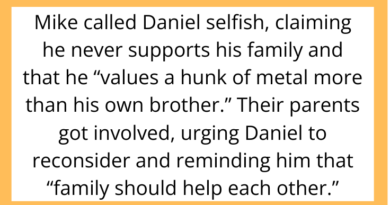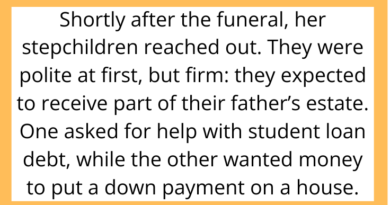Am I the Jerk for Asking My Stay-at-Home Wife to Start Working Again?
When household roles shift, tension can build quickly—especially when money starts to tighten and expectations don’t align. One Reddit user took to the r/AITAH community with a dilemma that sparked a firestorm of debate: Is it wrong to ask your stay-at-home spouse to return to work when the financial situation changes?
This AITAH story explores themes of financial balance, modern gender roles, partnership, and how responsibilities evolve in a long-term relationship.
The Situation: From Dual-Income to Single Breadwinner

The Original Poster (OP) explained that both he and his wife used to work full-time jobs. But after having their second child, they agreed that she would become a stay-at-home mom while he continued working to support the family.
Fast forward five years, their youngest is now in school full-time, and OP has been struggling to keep up with increasing financial pressure, longer work hours, and rising expenses. Burned out and anxious, he brought up the idea that his wife should consider returning to work now that their children are no longer home during the day.
That’s when things took a turn.
His wife was hurt. She accused him of devaluing her contributions to the household and called the suggestion “a betrayal of their agreement.” She insisted that taking care of the home is still work, and changing the terms now was unfair.
Now OP is left wondering: Am I the jerk for asking my stay-at-home wife to go back to work, even though it wasn’t part of the original plan?
Modern Marriages: Changing Roles and Expectations

The Stay-at-Home Parent Debate
There’s no denying that being a stay-at-home parent is a full-time job—especially in the early years of a child’s life. From diaper changes to school runs, meal prep, and emotional labor, it’s relentless and often undervalued.
But what happens when the children grow older and more independent? Is the role of the stay-at-home parent expected to evolve too?
In OP’s case, both kids are now in school from 8 to 3, and OP feels overwhelmed managing the financial burden alone. His wife, however, sees her role as still essential—managing the home, supporting the children after school, and ensuring family routines stay smooth.
It’s a common debate in modern marriages: When do family roles adjust, and how do you renegotiate them fairly?
Financial Fatigue and the Reality of One Income

Rising costs of living, inflation, and career burnout are realities many families face. What may have worked five years ago may no longer be sustainable today.
OP’s financial fatigue is not uncommon. Many Redditors empathized with the pressure of being the sole earner. Some noted that asking a spouse to help shoulder the burden doesn’t necessarily mean undervaluing their contribution—it can also reflect a need for partnership during tough times.
Communication Breakdown or Valid Request?

Did OP Cross a Line?
Some commenters argued that OP violated a mutual agreement. If both partners agreed to a stay-at-home arrangement long-term, then trying to change the terms without renegotiation feels unfair.
Others suggested that agreements made years ago aren’t meant to be permanent—they should evolve with life’s changes.
The core issue here isn’t just financial. It’s about communication, respect, and the ability to adapt. Was OP’s request an honest conversation about survival? Or was it dismissive of the invisible labor his wife provides?
Her Perspective: Feeling Undervalued

From the wife’s side, her anger came from feeling like her efforts were invisible. Many stay-at-home parents struggle with this exact sentiment—feeling like what they do is taken for granted because it doesn’t generate income.
She likely fears that re-entering the workforce would disrupt the household balance she’s spent years building. And perhaps she worries about losing her identity or confidence after years away from the job market.
This isn’t just about money. It’s about validation, identity, and mutual respect.
Reddit Weighs In: Mixed Reactions

Reddit’s AITAH community was divided, but here were some of the most common takeaways:
Not the jerk (majority opinion):
“You’re not wrong for needing support. Life changes. Agreements should too.”
“Being a SAHM doesn’t mean you’re off the hook forever. If the kids are in school and money’s tight, it’s fair to talk about changes.”
“You’re asking for a discussion, not making demands. That’s what a partnership is.”
Soft jerk or ESH (everyone sucks here):
“You’re both failing to communicate respectfully. She felt ambushed. You felt ignored. Neither of you are villains—but you need therapy or a mediator.”
“If you agreed to something long-term, you can’t just flip the switch. You need to talk about what a return to work would look like.”
She’s not the jerk (minority view):
“She sacrificed her career for your kids. Asking her to jump back in without support or transition planning is tone-deaf.”
Moving Forward: Rebuilding Partnership with Empathy

Reframing the Conversation
It’s clear this conversation hit a nerve because it challenges deeply held beliefs about roles in marriage. But conversations like this don’t have to become battles.
OP could consider:
-
Acknowledging her contributions first, before jumping into finances.
-
Framing the request as a mutual effort to protect the family’s future.
-
Asking if and how she feels comfortable returning to work—not demanding it.
Likewise, the wife might explore:
-
Whether returning part-time or freelance is possible.
-
How she can support OP emotionally and financially.
-
Whether continuing as a full-time SAHM is sustainable long-term.
Partnership Over Pride
At the end of the day, this isn’t about who’s right—it’s about what’s right for both. Families thrive when decisions are made together, not imposed under stress.
Instead of holding onto past promises, couples might find more success focusing on the present reality and future goals.
Final Thoughts: Not the Jerk—But Not Blameless Either

So, is OP the jerk for asking his stay-at-home wife to work again?
Most of the AITAH community said no—but the bigger lesson was this: relationships require flexibility, communication, and above all, empathy.
Circumstances change. People change. And agreements made during one phase of life might not apply forever. The real work lies in how couples adapt together—without resentment, guilt, or silence.



